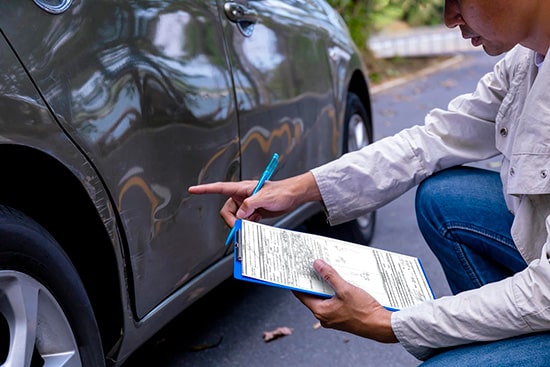Colorado Car Insurance Guide: Everything You Need to Know about State Requirements
Our Denver car accident attorneys have extensive experience handling injury cases. It doesn’t matter if you have a minor scrape or a major collision, we are here for you.
By law, every driver is required to have at least some insurance coverage in the event that they cause an auto accident that results in the injury of another person or damage of property. While this standard is set for everyone regardless of where they live in the U.S., each state is responsible for determining specific limits on certain types of coverage. This means that car insurance minimum requirements can vary state-to-state.
Most insurers recommend that your bodily injury liability insurance limits be set for at least $100,000 per person and $300,000 per accident. But insurance premiums can be pricey, so you may be asking:
What is the minimum auto insurance coverage in Colorado?
Minimum Auto Insurance Requirements in Colorado
Up until 2003, Colorado was a “no-fault” state, meaning that any driver who was involved in an accident could collect medical, disability, and other compensation from their own insurance company, regardless of their degree of fault for the collision.
However, in order to help reduce the cost of insurance premiums, prevent claims abuses, and shed restrictions on non-economic losses such as pain and suffering, Colorado switched to the tort system. Under this fault-based system, drivers who are seeking compensation must first establish fault before any insurance claim will be paid. The person who is found to be “at-fault” for the accident is liable for paying for any resulting damages and injuries (or more accurately, their insurance company will pay for damages up to the policy limits).
Furthermore, all Colorado drivers are obligated to carry the following minimum liability insurance coverage:
- Bodily Injury (BI) – $25,000 per person and $50,000 per accident. This coverage applies to accidents involving the death or injury of another person. However, financial experts advise drivers to carry at least a 100/300 policy ($100,000 per person and $300,000 per occurrence). Carefully consider what you can afford when choosing your coverage amount.
- Property Damage (PD) – $15,000 per incident. PD liability coverage insures you for damage done to someone else’s property. Typically, this is a vehicle, but it also covers damage to buildings, utility poles, and other physical property.
Optional Auto Insurance Coverage To Consider
Beyond the mandatory minimum coverage requirements for Colorado drivers, insurance companies also offer several optional coverage types that we highly recommend, including:
- Uninsured/Underinsured Motorist Coverage (UM/UIM) – Helps cover medical expenses and damages when you are hit by a driver without auto insurance or with insufficient coverage. Insurers in Colorado are required to offer UM/UIM coverage for the same amount as the bodily injury limits you choose, and it can only be waived if you reject it in writing.
- Collision – Covers damage to your car caused by hitting other objects, such as a fire hydrant, wall, or another vehicle.
- Comprehensive – Coverage for non-accident-related incidents or other factors like theft, extreme weather, and wildlife.
- Medical Payments (Med Pay, or MPC) – Helps cover a portion of your injuries arising from an accident, particularly medical bills for treating head trauma. As of January 1, 2009, Colorado insurers are required to offer you $5,000 in coverage, unless you opt-out.
Motorcycle Insurance Minimum Requirements
Just like four-wheeled automobiles, all two- or three-wheel motor vehicles in Colorado must be registered and insured based on the standards set by the state. Vehicles that fall into this category are motorcycles, motor-powered bicycles, scooters, and any other engine-powered mode of transportation with three wheels or less (excluding farm tractors).
Motorcyclists in Colorado must adhere to the same minimum requirements as drivers of cars: a 25/50 coverage policy with $15,000 for property damage. Failure to carry insurance in the event of a motorcycle accident can result in a $500 fine, four points on your driving record, and a possible suspension for the first offense.
Penalties for Driving Without Insurance
Failure to hold at least the required minimum insurance coverage can result in various penalties and fines, including:
- 4 points on your driving record
- $500 minimum fine (up to $1,000 for additional offenses)
- Possible license suspension (until you show proof of insurance on the first offense, or up to 8 months for additional offenses)
- Up to 40 hours of community service
On top of these fines, you will likely face much higher insurance rates when you apply for coverage after a period of not having a policy.
What’s more, attempting to save money by failing to get the mandatory minimum insurance coverage requirements set by the state of Colorado simply isn’t worth the risk to your personal finances since you would be on the hook for any damages or injuries you cause in a car accident while uninsured. In fact, you may want to think about expanding your coverage if possible. That way, you can be sure you have financial help when you need it most.
If you are involved in a collision with another driver who is uninsured or underinsured, then talk to one of the trusted Denver car accident attorneys at The Babcock Law Firm.
In the meantime, continue reading these related articles for more information…
Watch out for car accident scams
Car accident scams are on the rise in Denver, but knowledge is power. Protect yourself before or after an accident with these simple tips.
**NOTE: This article and all content on InjuryLawColorado.com is for informational purposes only and does not constitute legal advice.


